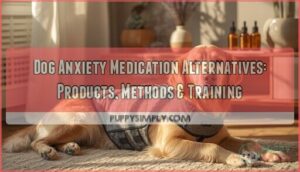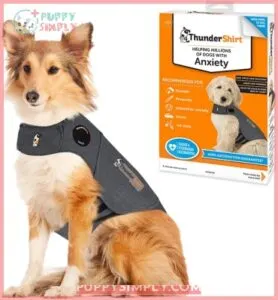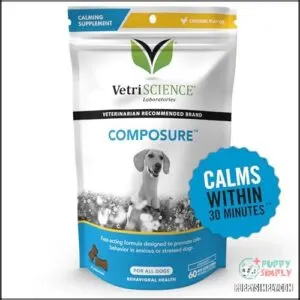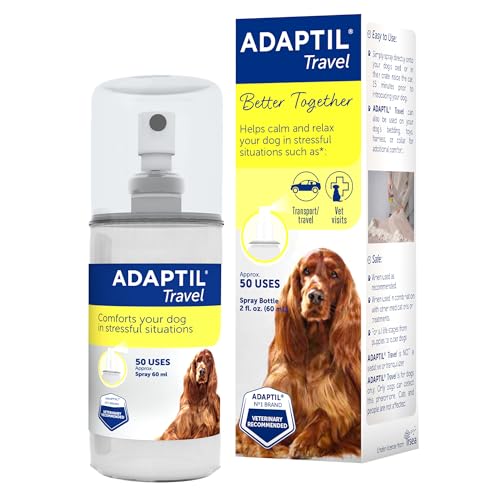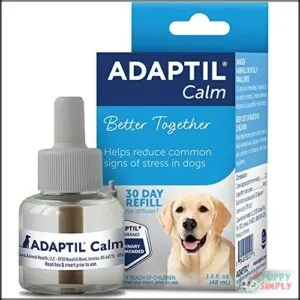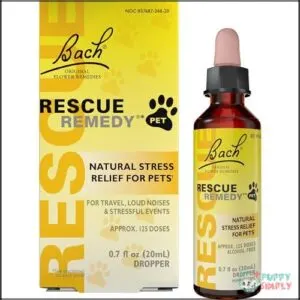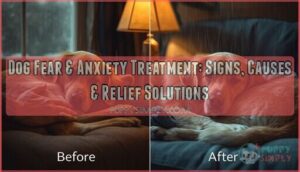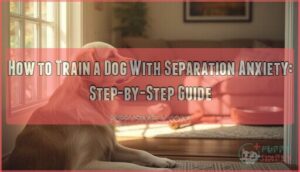This site is supported by our readers. We may earn a commission, at no cost to you, if you purchase through links.
Nearly 70% of dogs experience some form of anxiety during their lifetime, yet medication isn’t the only path forward. Many owners worry about side effects, long-term dependency, or simply want to exhaust gentler options first.
The good news? A growing body of veterinary research endorses dog anxiety medication alternatives that range from pressure therapy vests to targeted amino acid supplements. These approaches don’t just mask symptoms—they address the neurological and behavioral roots of canine stress.
Whether you’re dealing with thunderstorm panic, separation distress, or general nervousness, combining the right products with evidence-based training techniques can transform your dog’s emotional well-being without a prescription bottle in sight.
Table Of Contents
- Key Takeaways
- Top 5 Dog Anxiety Medication Alternatives
- Natural and Holistic Calming Methods
- Behavioral and Training Strategies
- Environmental and Lifestyle Adjustments
- Frequently Asked Questions (FAQs)
- What are anxiety reducing medications for dogs?
- Can anxiety be cured?
- Are there different types of anxiety medications for dogs?
- What is a good dog anxiety medication (OTC)?
- What is the best drug for anxiety in dogs?
- How can I calm my anxious dog down?
- Can you train anxiety out of a dog?
- Can I give my dog Benadryl® for anxiety?
- Can I give my dog melatonin for anxiety?
- Can essential oils be used for dog anxiety?
- Conclusion
Key Takeaways
- ThunderShirt pressure vests, calming chews with L-theanine, and pheromone diffusers offer drug-free anxiety relief, though individual dog responses vary significantly and work best alongside behavioral modification rather than as standalone solutions.
- Natural supplements like L-theanine (2-6 mg/kg), chamomile, and valerian root reduce anxiety through neurotransmitter pathways without sedation, but you’ll need veterinary approval before combining them with prescription medications to avoid dangerous interactions.
- Desensitization paired with positive reinforcement training addresses the root cause of anxiety by reshaping your dog’s emotional responses to triggers, proving more effective long-term than simply masking symptoms with products alone.
- Daily aerobic exercise (30-60 minutes) combined with mental stimulation through puzzle feeders reduces cortisol by 29-32% in anxious dogs, making lifestyle adjustments as critical as any anxiety product you might purchase.
Top 5 Dog Anxiety Medication Alternatives
When prescription medications aren’t the right fit for your dog, several proven alternatives can provide meaningful relief from anxiety. These products work through different mechanisms—from gentle pressure therapy to pheromone signaling—giving you options that match your dog’s specific needs and triggers.
Here are five research-backed alternatives that veterinary behaviorists commonly recommend to their clients.
1. Dog Anxiety Relief Vest ThunderShirt Large
The ThunderShirt Large offers pressure therapy that works like a comforting hug during anxiety triggers. You’ll wrap this vest around your dog’s torso—sized for chest girths 26 to 40 inches—applying gentle, constant pressure that activates the parasympathetic nervous system.
It’s effective for thunderstorms, fireworks, and separation scenarios. While not every dog responds identically, many owners report decreased pacing and vocalization.
Proper vest sizing matters: measure your dog’s chest at its widest point before ordering. This anxiety relief product works best alongside behavioral modification rather than as a standalone dog anxiety solution.
| Best For | Dog owners looking for a drug-free way to manage their pet’s anxiety during stressful events like storms, fireworks, or vet visits, especially for dogs weighing 40+ pounds with chest sizes between 26-40 inches. |
|---|---|
| Anxiety Type | Situational/Event-based |
| Method | Pressure therapy |
| Drug-Free | Yes |
| Onset Time | Immediate |
| Duration | While worn |
| Best For | 40+ lb dogs |
| Additional Features |
|
- Works immediately without training—just wrap it on before anxiety triggers and the gentle pressure starts calming your dog right away.
- Machine washable and made with breathable fabric, so it’s easy to keep clean and comfortable for regular use.
- Adjustable straps let you customize the fit for consistent pressure, and most retailers offer easy exchanges if you need a different size.
- Results vary widely—some dogs show little to no improvement, so it’s not a guaranteed solution for every anxious pet.
- Sizing can be tricky to get right the first time, and some customers report needing to exchange for a better fit.
- Some users experienced durability issues with Velcro patches coming off after repeated use.
2. Dog Anxiety Relief Chews
For dogs who won’t tolerate compression garments, calming chew ingredients offer another anxiety relief path. These supplements combine L-theanine, chamomile, and valerian root—natural calming agents that work through neurotransmitter modulation rather than sedation.
Chew dosage guidelines vary by weight, usually starting thirty minutes before anticipated stressors. Product efficacy comparison shows inconsistent results: some dogs respond within the recommended timeframe while others show minimal behavioral change.
Natural anxiety remedies like these work best for mild-to-moderate dog anxiety situations—vet visits, car rides, or brief separations—rather than severe panic disorders requiring prescription intervention.
| Best For | Dogs experiencing mild to moderate situational anxiety during specific events like vet visits, car rides, thunderstorms, or fireworks who need fast-acting relief without sedation. |
|---|---|
| Anxiety Type | Situational/Event-based |
| Method | Oral supplement |
| Drug-Free | Yes |
| Onset Time | 30 minutes |
| Duration | Up to 4 hours |
| Best For | Weight-based dosing |
| Additional Features |
|
- Works quickly (within 30 minutes) and maintains effectiveness for up to 4 hours without making your dog drowsy or lethargic
- Contains clinically studied ingredients like L-theanine and colostrum that support natural calming through neurotransmitter activity
- Chicken-flavored chews make administration easy since most dogs take them willingly as a treat
- Results vary significantly between dogs—some owners report no calming effect or even adverse reactions like hyperactivity
- Can cause digestive issues including stomach upset and diarrhea in certain dogs
- No refund or return policy means you’re stuck with the product if it doesn’t work for your pet
3. ADAPTIL Dog Calming Spray
Pheromone therapy offers yet another natural anxiety relief option when chews fall short. ADAPTIL Dog Calming Spray releases synthetic versions of maternal canine pheromones—the same chemical signals nursing mothers produce to comfort puppies.
You’ll spray it on bedding, crates, or car seats fifteen minutes before anticipated canine stress events, letting the alcohol base evaporate before your dog encounters the treated surface.
Research shows variable spray efficacy across individual dogs: some display noticeably calmer body language during thunderstorms or vet visits, while others show minimal behavioral response to these calming sprays.
| Best For | Dog owners looking for a drug-free way to ease their pet’s anxiety during short-term stressful situations like car rides, vet appointments, or fireworks. |
|---|---|
| Anxiety Type | Situational/Event-based |
| Method | Pheromone spray |
| Drug-Free | Yes |
| Onset Time | 15 minutes |
| Duration | Several hours |
| Best For | All sizes |
| Additional Features |
|
- Uses natural pheromone science that mimics a mother dog’s calming signals, so there’s no sedation or medication involved
- Works fast—just spray it on bedding or crates 15 minutes before a stressful event and each application lasts several hours
- Versatile enough to handle different anxiety triggers, from thunderstorms to new environments
- Results vary quite a bit from dog to dog—some see clear improvement while others show little to no change
- Not strong enough for serious anxiety issues like severe separation anxiety or aggression, where you’d need professional help
- Has a temporary alcohol smell when first applied that needs to air out before your dog uses the sprayed area
4. Adaptil Dog Calming Pheromone Refill
If portable pheromone therapy doesn’t fit your dog’s lifestyle, plug-in diffusers offer continuous anxiety management throughout your home. The Adaptil Dog Calming Pheromone Refill maintains steady canine stress reduction across 700 square feet for roughly thirty days, making it ideal for separation anxiety or general nervousness.
You’ll replace refills monthly and swap diffusers every six months to maintain effectiveness—a commitment worth considering before investing in this natural anxiety relief system. While many dogs respond positively, individual results vary considerably.
| Best For | Dog owners dealing with separation anxiety, fear of loud noises, or general nervousness who want a hands-off, continuous calming solution that covers their home. |
|---|---|
| Anxiety Type | Separation/General |
| Method | Pheromone diffuser |
| Drug-Free | Yes |
| Onset Time | Continuous |
| Duration | 30 days per refill |
| Best For | All sizes |
| Additional Features |
|
- Covers up to 700 square feet with steady pheromone release, so you’re not constantly reapplying or adjusting anything throughout the day.
- Drug-free approach that mimics natural calming signals, making it safe for dogs of all ages without sedative side effects.
- Works well for common stress triggers like being home alone, thunderstorms, or adjusting to new environments.
- Monthly refill costs and replacing the diffuser every six months adds up over time compared to one-time purchases.
- Results aren’t guaranteed—some dogs show little to no improvement depending on their individual temperament and anxiety level.
- Refills may not last the full 30 days in larger rooms or humid conditions, shortening the value you get per cartridge.
5. Pet Stress Relief Rescue Remedy Dropper
Flower essences won’t replace evidence-based anxiety treatment options, but Rescue Remedy Dropper occupies a niche in integrative approaches for mild situational stress. This homeopathic remedy contains five plant extracts—Star of Bethlehem, Rock Rose, and three others—delivered through glycerin-based drops you’ll administer four times daily during acute stressors like vet visits.
Peer-reviewed studies supporting efficacy in dogs remain scarce, so consider it a complement to natural calmers such as L-theanine and behavioral modification rather than a standalone solution for dog anxiety or chronic stress relief.
| Best For | Pet owners seeking a gentle, non-sedative option to ease mild anxiety during short-term stressful events like vet trips, fireworks, or travel. |
|---|---|
| Anxiety Type | Situational/General |
| Method | Flower essence drops |
| Drug-Free | Yes |
| Onset Time | Immediate |
| Duration | As needed |
| Best For | All breeds/ages |
| Additional Features |
|
- Safe formulation with no sedation, making it easy to use during the day without affecting your pet’s alertness or energy levels.
- Simple administration through multiple methods—add to food, water, treats, or give directly by mouth.
- Suitable for all dog and cat breeds, ages, and sizes, with a vegan and grain-free formula.
- Limited scientific evidence from peer-reviewed studies means effectiveness varies widely among individual pets.
- Not a replacement for proven anxiety medications or comprehensive behavioral training programs.
- Results are often inconsistent, with many users reporting little to no noticeable improvement in their pet’s stress levels.
Natural and Holistic Calming Methods
When you’re looking for gentler approaches to ease your dog’s anxiety, natural and whole-body methods present a beneficial middle ground between behavioral training and prescription medication.
These options work with your dog’s biology to promote calm without the potential side effects of pharmaceutical interventions.
Let’s explore three evidence-based natural strategies that can help your anxious dog find relief.
L-Theanine and Other Dietary Supplements
L-Theanine benefits your dog by promoting relaxation without sedation, usually dosed at 2–6 mg per kilogram of body weight. This amino acid therapy works through GABA and dopamine pathways, offering anxiolytic effects in mildly stressful situations.
You’ll often find L-Theanine combined with B-vitamins or omega-3s in calming nutraceuticals. While dietary supplement safety is generally favorable, you should consult your veterinarian before starting any natural remedies to guarantee proper dosing and avoid interactions with other medications.
Researchers utilize scientific study summaries to evaluate the efficacy of such supplements.
Herbal Remedies (Chamomile, Valerian Root)
Chamomile effects include mild sedation through apigenin binding to benzodiazepine receptors, commonly dosed at 0.25–0.5 ml of glycerite per 10 kilograms. Valerian root offers similar calming properties but requires careful monitoring for botanical safety concerns like gastrointestinal upset.
Both herbal remedies can produce herbal interactions with prescription anxiolytics or sedatives, so you’ll need veterinary approval before combining natural calmers with existing medications.
Aromatherapy and Calming Essential Oils
Lavender and chamomile appear in many Essential Oil Blends for dogs, but you’ll need strict Oil Safety Guidelines—undiluted oils cause toxicity. Aromatherapy Benefits remain modest without substantial clinical proof, so treat Scent Therapy as one piece of Comprehensive Approaches to Anxiety.
- Use only veterinary-approved Calming Diffusers in well-ventilated spaces
- Never apply concentrated oils directly to skin or fur
- Combine aromatherapy with Natural Remedies like L-Theanine for better results
- Monitor closely for adverse reactions like drooling or lethargy
Calming Aids work best when layered together under professional supervision.
Behavioral and Training Strategies
Training your dog’s mind is often more powerful than medicating their body. The right behavioral strategies tackle the underlying reason for anxiety rather than just masking symptoms.
Training your dog’s mind often proves more powerful than medicating their body, addressing anxiety’s root cause instead of masking symptoms
Here’s how you can reshape your dog’s emotional responses through proven training techniques.
Desensitization and Counterconditioning
You can reshape your dog’s fear response by pairing controlled trigger exposure with something he loves. Gradual desensitization starts below his panic threshold—maybe playing doorbell sounds at whisper volume while offering treats.
Counterconditioning techniques replace anxiety with positive associations through behavioral therapy for dogs. This behavioral modification approach addresses separation anxiety and other fears by teaching calming signal training.
Progress demands patience, but it’s remarkably effective for long-term dog anxiety relief.
Positive Reinforcement Training
Rewarding calm behaviors the moment they appear teaches your dog that staying relaxed pays off. Behavior shaping through clicker training marks precise successes within seconds, strengthening the connection between stillness and treats.
Training protocols built on reward schedules turn behavioral modification into measurable progress. This behavioral therapy for dogs tackles anxiety at its root, building confidence through dog training that replaces panic with learned composure.
Creating a Safe and Predictable Environment
Environmental Management starts with where your dog spends downtime. A consistent daily routine—feeding at 7 AM, walks at noon, rest by 8 PM—reduces anxiety-related behaviors by setting predictable expectations. Routine Building through these rituals offers powerful Dog Stress Relief Strategies:
- Designate a quiet retreat area with familiar bedding for Separation Anxiety recovery
- Use white noise and gradual lighting for Stress Reduction during high-arousal periods
- Establish clear handling signals across all household members to prevent conflicting cues
Predictable Spaces support Behavioral Modification better than medication alone.
Socialization and Routine Building
Building Social Bonds through controlled exposure to people, dogs, and new places diminishes overreactive Dog Behavior over time.
Predictable Schedules—morning walks, afternoon play, evening rest—create Environmental Stability that reduces Dog Anxiety more effectively than sporadic routines.
Combine Routine Exercises with positive Training during socialization sessions to reinforce Canine Confidence. These Behavioral Strategies address root causes, not just symptoms.
Environmental and Lifestyle Adjustments
Your dog’s daily environment plays a bigger role in anxiety management than most pet owners realize. Simple changes to routine, space, and activity levels can dramatically reduce stress without any medication at all.
Let’s look at four practical adjustments that create a calmer, more confident dog.
Anxiety-Reducing Toys and Puzzles
Puzzle feeders and interactive toys offer real relief for dog anxiety without medication. When your dog’s nervous energy needs an outlet, these tools redirect focus toward problem-solving rather than worry. Studies show puzzle feeders reduce pacing during stressful events, while Kong-style toys extend engagement for several minutes per session.
- Interactive puzzle feeders slow eating and lower stress indicators during anxiety-triggering situations
- Kong-style treat toys provide variable resistance that channels anxious energy into focused activity
- Snuffle mats encourage olfactory exploration, reducing locomotor activity in anxious dogs
- Treat-dispensing balls combine movement with reward for controlled, calming play therapy
- Food-hiding toys create brief problem-solving tasks that may decrease anxiety-related vocalization
Start with low difficulty to prevent frustration, rotate toys to maintain novelty, and supervise initial sessions to verify safe use.
Proper Crate Training Techniques
While puzzle toys engage your dog’s mind, crate training establishes a physical sanctuary that tackles separation anxiety directly. Done right, a properly sized crate becomes your dog’s personal retreat—not a prison. Start with brief crate introduction sessions using high-value treats, positioning the crate in quiet areas where calming routines happen naturally.
| Training Phase | Duration | Key Action |
|---|---|---|
| Introduction | 5-10 minutes | Reward crate entry, door open |
| Gradual increase | 15-30 minutes | Close door briefly, stay nearby |
| Extended sessions | 1-2 hours | Lengthen time, monitor stress signs |
| Nighttime comfort | Full night | Use familiar scent, consistent cue |
| Troubleshooting | Variable | Reduce duration if resistance occurs |
Match crate size so your dog stands and turns comfortably. Layer soft bedding, add quiet music during training schedules, and never use the crate for punishment—these behavioral strategies in dog training and behavior prevent negative associations. Schedule crate time after walks when your dog’s naturally tired, building positive patterns that reduce dog anxiety over weeks rather than days.
Exercise and Mental Stimulation
Physical and mental workouts form the backbone of canine mental health management. Aerobic exercise—30 to 60 minutes daily of brisk walks or fetch—reduces cortisol by 29% in anxious dogs.
Pair that with mental stimulation through puzzle feeders and scent games, which lower stress markers by 32%. Exercise intensity matters: moderate activity beats exhausting sprints for stress reduction and behavioral strategies that stick.
Pressure Therapy and Compression Garments
Compression wear like ThunderShirt applies controlled pressure to your dog’s torso and pressure points, reducing anxiety-related arousal during storms or fireworks. These calming wraps and anxiety vests offer modest cortisol reductions in trials, providing anxiety relief without medication.
Verify proper fit for torso support—too tight restricts breathing, too loose won’t deliver the calm vest benefits. They work best alongside behavior modification, not as standalone dog anxiety solutions.
Frequently Asked Questions (FAQs)
What are anxiety reducing medications for dogs?
Prescription anxiety medications for dogs include fluoxetine and clomipramine, both FDA-approved for separation anxiety.
Trazodone manages situational stress, while alprazolam manages acute episodes.
Each works differently, targeting specific anxiety types and severity levels.
Can anxiety be cured?
Like chasing the horizon, truly curing anxiety in dogs remains elusive. Anxiety is a chronic condition requiring ongoing anxiety management and relapse prevention rather than a one-time cure, though long-term outcomes improve with consistent behavioral support.
Are there different types of anxiety medications for dogs?
Yes, veterinarians prescribe several prescription medications for dogs, including SSRI medications like fluoxetine, tricyclic antidepressants such as clomipramine, benzodiazepine options for acute episodes, GABA agonists, and occasionally mood stabilizers under specialist guidance.
What is a good dog anxiety medication (OTC)?
Several OTC options can help anxious dogs. Diphenhydramine (Benadryl), melatonin, and L-theanine supplements show promise for mild anxiety.
CBD products and calming chews containing chamomile or valerian root are also available—always consult your veterinarian first.
What is the best drug for anxiety in dogs?
Fluoxetine and clomipramine are the most effective prescription medications for dog anxiety, with strong evidence supporting their use.
Your veterinarian will select the best option based on your dog’s specific anxiety type and health profile.
How can I calm my anxious dog down?
The most anxious dogs often need the simplest solutions first: calming music, gentle dog massage, and emotional support create immediate stress relief.
Natural remedies and calming aids work alongside behavioral strategies for complete anxiety relief. Additionally, using a dog calming aid can be an effective way to reduce anxiety in dogs.
Can you train anxiety out of a dog?
Training can markedly reduce behavioral problems and fear responses to anxiety triggers, though complete resolution isn’t always possible.
Behavioral therapy combining desensitization, calming techniques, and positive reinforcement produces measurable training outcomes for managing canine anxiety when applied consistently.
Can I give my dog Benadryl® for anxiety?
Think of Benadryl as a band-aid on a deeper wound—it might offer temporary relief, but it won’t solve your dog’s anxiety.
Always consult your veterinarian before using over-the-counter medications for separation anxiety or other anxiety symptoms.
Can I give my dog melatonin for anxiety?
Yes, you can give melatonin for dog anxiety under veterinary guidance. Typical doses range from 1–3 mg based on weight, but consult your vet first to verify supplement safety and proper melatonin dosage for anxiety relief.
Can essential oils be used for dog anxiety?
Essential oils carry significant toxicity risks for dogs and aren’t recommended. Tea tree, eucalyptus, and citrus oils can cause vomiting, tremors, or worse.
Safer alternatives like pheromone diffusers offer genuine anxiety relief without phytotoxicity dangers.
Conclusion
Your dog’s anxiety won’t vanish overnight, but the right combination of dog anxiety medication alternatives can rewrite their entire emotional story. From pressure vests to amino acid supplements, these tools work best when paired with consistent behavioral training and environmental structure.
Start with one or two approaches, observe your dog’s response over several weeks, and adjust accordingly. With patience and informed choices, you’re building a calmer, more confident companion—no prescription required.

